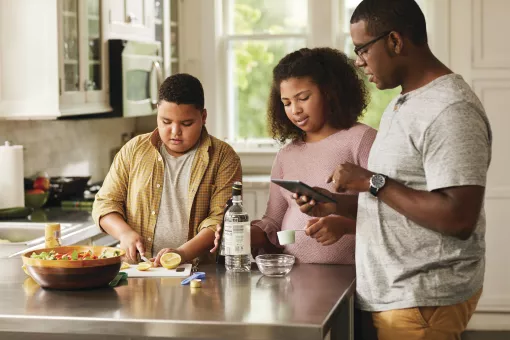School may be out due to the current health crisis, but there’s still a lot that kids can learn when they’re at home. Now is the perfect time to help your child learn practical life skills that they wouldn’t necessarily pick up in a classroom. From budgeting to laundry, there are tons of valuable life skills you can teach your child right now to help them continue to grow into well-rounded individuals.
HOW TO CREATE A BUDGET
One of the most important lessons you can teach your child is how to manage their money smartly. To get them on the path to financial literacy, try starting with the basics of budgeting. A great way to include them in learning about your household’s finances is to work with your child to create a weekly menu of meals. Then, help them create a shopping list and estimate how much each ingredient will cost while staying under a set amount.
Bonus: Ask your child to help prepare the meals they’ve planned so they can pick up some cooking basics in the kitchen!
Online games and apps to teach your kids about money
HOW TO DO LAUNDRY
Even in a crisis, the laundry never stops. Now is as good a time as any to teach your child how to properly clean their clothes, including what settings to use to protect clothes; how much detergent to use; when to use bleach or stain remover; and how to iron, hang, or fold clothes after they come out of the dryer.
Bonus: Snags and tears are bound to happen. Teach your child how to repair clothes, like how to sew on a button.
Step-by-step directions for sewing a button
HOW TO WRITE AND MAIL A LETTER
Even though most of our communication is digital these days, there is value in being able to put a pen to paper and write a letter. It’s a time-honored way to let someone you care about know you’re thinking of them or to thank someone. In addition, it's also an wonderful way to hone their writing skills and help them become clear communicators. Once they’ve written the letter, you can teach them how to properly stamp and address it, then walk to your nearest mailbox to send it on its way.
Why letter writing is an essential skill for kids
HOW TO READ A MAP
GPS and apps on our phones that read us directions have changed the way we travel, but it is still useful to know how to correctly read a map. When your phone dies or there isn’t signal, being able to accurately interpret a map is an important way to avoid getting lost and is an essential safety skill. Help your kids develop their spatial thinking skills with the help of a map!
Start by pulling out a road atlas or printing off a map of your city, then teach your child how to navigate by reading finding north, south, east, and west. Then, help them plan a route to a favorite location and create written directions for how to get there, including street names, directions, and distance.
Bonus: If you have a compass, set up a mini-orienteering course in your house or around your neighborhood and have your child use the compass to navigate to a hidden treasure.
Why kids still need to read (and draw) maps
HELPING OUR KIDS APPRECIATE WHAT MATTERS
Soon after the coronavirus began to disrupt daily life in the United States, blogger Jaime Ragsdale wrote about how this experience could actually be good for kids.
“What if instead of ‘behind’ this group of kids is advanced because of this? What if they have more empathy, they enjoy family connection, they can be more creative and entertain themselves, they love to read, they love to express themselves in writing. What if they enjoy the simple things, like their own backyard and sitting near a window in the quiet?” she asks. “What if this generation is the ones to learn to cook, organize their space, do their laundry, and keep a well-run home? What if they learn the value of eating together as a family and finding the good to share in the small delights of the everyday?”
While it’s important for kids to continue to focus on their education, there are other ways the experience of living through a pandemic can shape their lives. As a parent, you can help them navigate the uncertainty and fear and help them not only have hope in the future, but emerge from this crisis stronger and more resilient so they can continue to learn, grow, and thrive.
